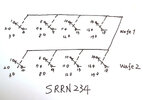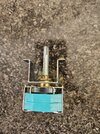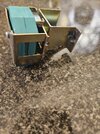The switch we would use is made by Alps. A single deck has four circuits. The 139XLR schemo shows at least 5 sections in the mode selector.
Here's a fleabay link to the 8-pole version Has two decks of four circuits each.
https://www.ebay.com/itm/1441452140...pid=5336136228&customid=&toolid=10001&mkevt=1
That one has a 20 mm long shaft. The same switch with a longer 25mm shaft has the same part number. Go figure.
https://www.ebay.com/itm/1338427251...pid=5336136228&customid=&toolid=10001&mkevt=1
Pretty sure the first number with the short shaft is what your radio needs.
Tricky part comes when the numbers on the lugs won't match from the old selector to the new one.
The Alps pin numbers are below. Best of luck.
73




